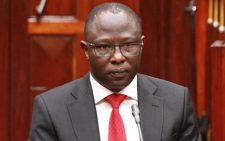Kenyans to wait until May 9 for new IEBC as interviews conclude

The first phase towards recruiting a new electoral commission chairman and members ends today as the Selection Panel concludes the interviews for the shortlisted candidates.
People Daily has established that the earliest that President William Ruto can receive the 11 names is on May 9, marking a milestone in the reconstitution of the Independent Electoral and Boundaries Commission (IEBC).
A source said the Selection Panel will retreat for one week from Monday to compile the report, hoping to conclude the exercise within the new timelines after Parliament approved additional time, shifting the deadline from April 28 to May 12. It has been a gruelling one-month exercise for the nine-member Nelson Makanda-led panel that started the interviews on March 24.
Eight candidates
During the initial two days, Makanda’s team embarked on grilling eight candidates for the position of chairman (IEBC) before interviewing another 111 candidates for the position of commissioners.
From the list of interviewees, the Panel will select two persons qualified to be appointed chairperson and nine persons qualified to be appointed as members of the Commission and hand the names to President Ruto.
Ruto will then nominate one person for appointment as the chairperson and six persons for appointment as members before forwarding the list of nominees to the National Assembly for approval hearing within seven days.
This means that if the President receives the names on May 9, he will forward the list of IEBC appointees to Parliament by May 16.
After receiving the names from Ruto, National Assembly Speaker Moses Wetangula will refer them to the Justice and Legal Affairs Committee (JLAC) for approval hearing.
Vetting exercise
Owing to the mounting pressure for the appointment of the new commissioner, Wetangula could direct JLAC to conclude the vetting exercise in one week, including report writing.
After the approval hearing, Parliament will forward the names to the President, who shall, within seven days, issue a Gazette notice to notify the public of the appointment of the chairperson and the members of the IEBC.
Kenyans can expect to know the new IEBC members in the first week of June.
It will be a full in-tray for the new commissioners as they assume office, which has been vacant since the exit of the former chairman Wafula Chebukati team in January 2023 after their term ended.
Apart from preparation for the 2027 general elections, the new commission will grapple with conducting by-elections in areas where their leaders died, where some have been vacant for more than two years. The new team will also be required to hold a referendum over two critical issues, including the boundary review for electoral areas and amendment of the constitution, for among other reasons rearrangement of the executive and creation of an official opposition office as stipulated in the National Dialogue Committee (Nadco) report.
Queries have been raised about the ability of the commission to undertake all these exercises in under two years without compromising on the 2027 polls, given that some of the processes may attract court cases, which further delay their realisation.
The constitution provides that replacement of IEBC commissioners should start six months before the term of the current team lapses, and the incoming team must be in office for two years before the next general elections.
Constitutional crisis
The civil society groups have in the past raised concerns over the delay in reconstituting the current electoral body team, warning that the country is already in a constitutional crisis, which could spark turmoil.
“We are late. We are now reconstituting the IEBC mid-term. We are exactly two and a half years to the general elections. We have done two and a half years. It’s a mid-cycle, and yet the substantive commission has not been put in place,” Electoral Law and Governance Institute for Africa (ELGIA) Executive Director Felix Owuor said during the People Dialogue last month.
Meanwhile, during yesterday’s interview session, former Registrar of the East African Court of Justice (EACJ) Yufnalis Okubo told the selection panel that it is legal for the regional court to hear an election that has been heard and determined in Kenya.
“There has been a lot of confusion around the EACJ hearing electoral cases from Kenya. The fact that a case has been decided in Kenya does not mean it cannot go to the East African Community,” he said.
Okubo clarified that when a case is escalated to the Arusha court, it does not land there as an appeal, stressing EACJ only determines if the Kenyan courts violated the Treaty for the Establishment of the East African Community while handling the cases.
In Article 7 (2) of the EAC treaty, Partner States must abide by the principles of good governance, including adherence to democracy, the rule of law, social justice, and the maintenance of universally accepted standards of human rights as operational principles.
Okubo referred to the Martha Karua and current Kirinyaga Governor Anne Waiguru case, saying EACJ hearing was not meant to overturn the decision of the Supreme Court.
“The petitioners were implying that while the matter was determined in Kenya, it violated the treaty. Her opponent had already been declared Kirinyaga governor. The court, therefore, found that it was the applicant’s right that had been violated under the treaty,” the interviewee added.











